

What Facebook May Do With Glancee, its Latest Mobile Acquisition. Over the weekend Facebook bought another mobile social app, this time a product called Glancee.
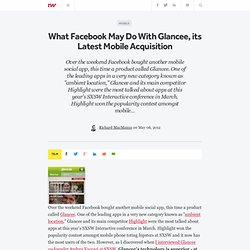
One of the leading apps in a very new category known as "ambient location," Glancee and its main competitor Highlight were the most talked about apps at this year's SXSW Interactive conference in March. Highlight won the popularity contest amongst mobile phone toting hipsters at SXSW and it now has the most users of the two. However, as I discovered when I interviewed Glancee co-founder Andrea Vaccari at SXSW, Glancee's technology is superior - at least on the backend.
And that is almost certainly what Facebook was after: Glancee's technology and talent. So the big question is: what will Facebook do with Glancee? This Ain't Another Instagram First, let's put this acquisition into perspective. So Facebook clearly didn't buy Glancee because it viewed the company as a potential threat, which was the main reason for buying Instagram. Glancee. It’s Not About Instagram — It’s About Mobile. Editor’s note: Guest author Keith Teare is General Partner at his incubator Archimedes Labs and CEO of just.me.
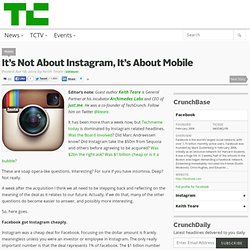
He was a co-founder of TechCrunch. Follow him on Twitter @kteare. It has been more than a week now, but Techmeme today is dominated by Instagram related headlines. Was the Board involved? Did Marc Andreessen know? These are soap opera-like questions. A week after the acquisition I think we all need to be stepping back and reflecting on the meaning of the deal as it relates to our future. So, here goes. Facebook got Instagram cheaply.
Instagram was a cheap deal for Facebook. 1% of Facebook is so little to the founders and shareholders of Facebook that the deal could be done and agreed over the weekend with only a minimum of Board involvement. There is no bubble There is definitely no bubble here. Mobile is a life or death play for the Internet giants A cursory glance at the Facebook S1 filing should make clear how important mobile is to the company: Facebook's Instagram deal faces FTC scrutiny. What Facebook Understood That Yahoo Didn’t: The Magic of a Billion Dollars. By Sarah Lacy On April 18, 2012 It’s not really a surprise that companies get less innovative the bigger they get.
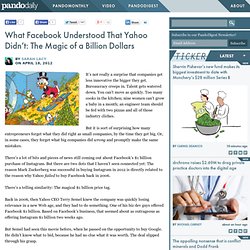
Bureaucracy creeps in. Talent gets watered down. You can’t move as quickly. Too many cooks in the kitchen; nine women can’t grow a baby in a month; an engineer team should be fed with two pizzas and all of those industry cliches. But it is sort of surprising how many entrepreneurs forget what they did right as small companies, by the time they get big.
There’s a lot of bits and pieces of news still coming out about Facebook’s $1 billion purchase of Instagram. There’s a telling similarity: The magical $1 billion price tag. Back in 2006, then Yahoo CEO Terry Semel knew the company was quickly losing relevance in a new Web age, and they had to do something. But Semel had seen this movie before, when he passed on the opportunity to buy Google. The details: Facebook spent $68 million on acquisitions last year. The details: Facebook spent $68 million on acquisitions last year Facebook revealed that it spent $68 million in cash and stock on acquisitions last year, according to its filing for an initial public offering.
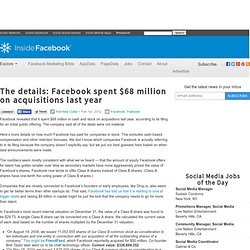
The company said all of the deals were not material. Here’s more details on how much Facebook has paid for companies in stock. This excludes cash-based compensation and other retention bonuses. We don’t know which companies Facebook is actually referring to in its filing because the company doesn’t explicitly say, but we put our best guesses here based on when deal announcements were made.
The numbers seem mostly consistent with what we’ve heard — that the amount of equity Facebook offers for talent has gotten smaller over time as secondary markets have more aggressively priced the value of Facebook’s shares. Companies that are closely connected to Facebook’s founders or early employees, like Drop.io, also seem to get far better terms than other startups do. Sponsored Post. Facebook's early acquisitions soar in value ahead of IPO - May. 11.
Facebook's FriendFeed purchase in 2009 gave the company Bret Taylor, now Facebook's chief technology officer.
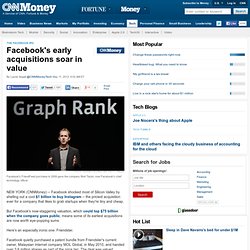
NEW YORK (CNNMoney) -- Facebook shocked most of Silicon Valley by shelling out a cool $1 billion to buy Instagram -- the priciest acquisition ever for a company that likes to grab startups when they're tiny and cheap. But Facebook's now-staggering valuation, which could top $75 billion when the company goes public, means some of its earliest acquisitions are now worth eye-popping sums. Here's an especially ironic one: Friendster. Facebook quietly purchased a patent bundle from Friendster's current owner, Malaysian Internet company MOL Global, in May 2010, and handed over 3.6 million shares as part of the price tag. The deal was valued around $40 million at the time, according to GigaOm and other tech blogs.